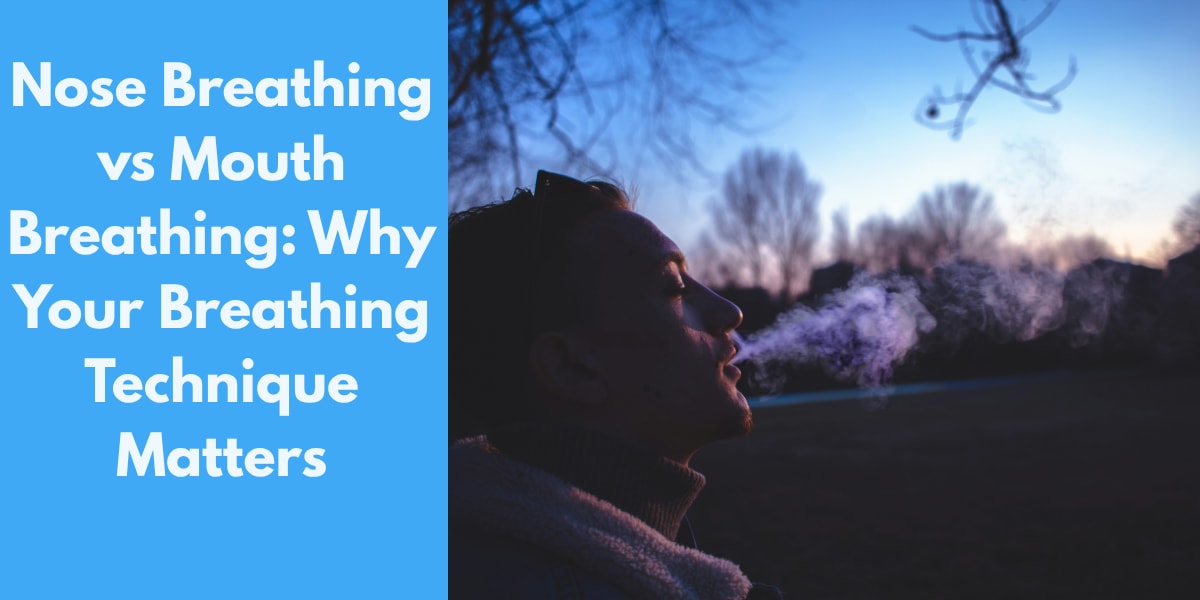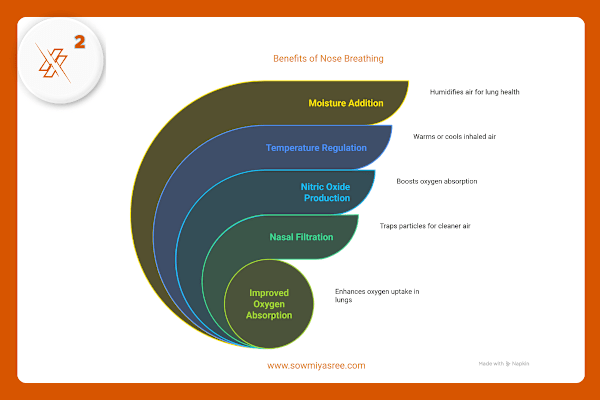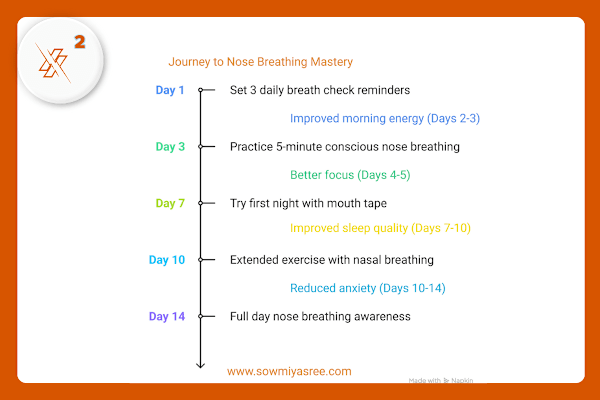Do you know that up to 61% of adults breathe through their mouths instead of their noses? You might be one of them, unknowingly sabotaging your energy and focus with every breath you take.
⏳8 min. Estimated Reading time.
⚡Why Your Breathing Method Matters for Health and Energy?
Imagine this: you're sitting at your desk, struggling to focus on an important task. Your energy is low, your mind is foggy, and you can't figure out why. The answer might be right under your nose—literally.
Most of us never think about how we breathe. It's automatic, after all. But the path that air takes into your body makes a world of difference to your health. Mouth breathing—which millions do without realizing—can actually be poisoning your system with unfiltered air and robbing your body of critical benefits.
🔍In this article, you'll discover:
- Why nose breathing is your body's preferred breathing method
- The surprising health benefits of nasal breathing you're missing out on
- A simple two-week challenge that could transform your energy, focus, and health
- Practical tips to break the mouth breathing habit for good
Let's dive into why something as simple as closing your mouth could be the wellness hack you've been missing all along.
📋Table of Contents
What is the Proper Breathing Technique? Nose vs Mouth Breathing Explained
5 Proven Benefits of Nose Breathing for Better Health
- Benefit 1: Your Built-in Air Purification System
- Benefit 2: Perfect Air Conditioning
- Benefit 3: Nitric Oxide — The Secret Performance Enhancer
- Benefit 4: The Calm Switch
- Benefit 5: Long-term Health Protection
How to Stop Mouth Breathing: 5 Expert Techniques That Work
Best Tools and Products to Help Transition to Nose Breathing
Nose Breathing Benefits: Start Your Two-Week Challenge Today
Frequently Asked Questions About Nose Breathing vs Mouth Breathing
Scientific Research and Studies
🌬️What is the Proper Breathing Technique? Nose vs Mouth Breathing Explained
Proper breathing means consistently breathing through your nose rather than your mouth. Your nose isn't just for smelling—it's your body's sophisticated breathing optimization system that filters, warms, and humidifies the air before it reaches your lungs.
When you breathe through your mouth, you bypass this natural filtration system. It's like drinking unfiltered water directly from a questionable source—you're letting in all the contaminants your body would normally filter out.
The science is clear: nose breathing allows your body to absorb oxygen more efficiently, activates your parasympathetic nervous system (promoting relaxation), and even helps maintain proper facial development and dental health.
If you need some statistical data, then here it is: nasal breathing can increase oxygen uptake by 10-20% compared to mouth breathing.
🚀5 Proven Benefits of Nose Breathing for Better Health
Benefit 1: Your Built-in Air Purification System
Your nose contains tiny hair-like structures called cilia that filter out toxins, allergens, and debris before air reaches your lungs. When you breathe properly, this natural defense system works 24/7.
Why it's important:
Every day, we breathe in approximately 25,000 times. That's 25,000 chances for pollutants, dust, allergens, and bacteria to enter your system. Mouth breathing bypasses this crucial filtration, allowing these irritants direct access to your lungs and body—essentially poisoning yourself with every breath.
- Nasal hairs trap large particles like dust and pollen
- Mucus membranes capture smaller toxins and pathogens
- This filtration reduces your risk of respiratory infections and allergic reactions
Benefit 2: Perfect Air Conditioning
Your nose humidifies and warms incoming air to the perfect temperature for your lungs. This conditioning process happens in milliseconds as air travels through your nasal passages.
Why it's important:
Your lungs function best with warm, moist air. Cold, dry air—which is what enters when you mouth breathe—can irritate lung tissue, trigger asthma symptoms, and make you more susceptible to infections. Your nose adds moisture to each breath, helping protect the delicate tissues of your respiratory system.
Benefit 3: Nitric Oxide—The Secret Performance Enhancer
When you breathe through your nose, your body produces nitric oxide—a molecule that expands blood vessels and improves oxygen absorption by an impressive 10-20%.
Why it's important:
Better oxygen utilization means more energy, improved cognitive function, and enhanced physical performance. It's like getting a free upgrade on every breath you take. This natural boost can help you think more clearly, work more efficiently, and perform better physically — all without any external supplements or stimulants.
Benefit 4: The Calm Switch
Nasal breathing activates your parasympathetic nervous system—your body's "rest and digest" mode—as opposed to the "fight or flight" stress response that mouth breathing can trigger.
Why it's important:
In our high-stress world, most of us spend too much time in a state of chronic stress. Nose breathing acts as a biological switch that helps your body counter stress naturally. This can lead to lower blood pressure, better digestion, improved immune function, and a calmer mind throughout your day.
Benefit 5: Long-term Health Protection
Consistent nose breathing supports proper facial development, prevents dry mouth, improves sleep quality, and strengthens your immune system over time.
Why it's important:
These benefits compound, creating a foundation for better long-term health and reduced risk of chronic conditions. Children who mouth breathe may develop narrow jaws, crooked teeth, and facial irregularities. Adults who mouth breathe often suffer from dry mouth, which increases the risk of tooth decay, gum disease, and bad breath. Switching to nose breathing can help reverse or prevent these issues.
Now that you understand the benefits, let's explore how to make nose breathing a consistent habit.
🤐How to Stop Mouth Breathing: 5 Expert Techniques That Work
Making the switch from mouth to nose breathing isn't just about keeping your lips closed. Here are expert-recommended techniques to help you breathe better:
- Practice mindful awareness — Set reminders on your phone to check your breathing throughout the day. Many people mouth breathe without realizing it, especially during focused work or when stressed.
- Try mouth taping. Dr. Mark Burhenne, a functional dentist, recommends using a small piece of surgical tape to gently seal the lips during sleep. "This might sound extreme," he says, "but it's one of the most effective ways to train yourself to nose breathe at night."
- Address nasal obstructions — If you have chronic nasal congestion, allergies, or structural issues like a deviated septum, consult with an ENT specialist. Sometimes, the solution is as simple as using a saline spray or allergy medication.
- Practice breathing exercises — Try box breathing: inhale through your nose for 4 counts, hold for 4, exhale through your nose for 4, and hold for 4. Repeat for several minutes each day to strengthen your nasal breathing capacity.
- Consider your sleeping position — Sleeping on your side rather than your back can reduce the likelihood of mouth breathing during sleep.
These practices can help retrain your body to default to nasal breathing, even during sleep when you’re not consciously controlling it.
🔧Best Tools and Products to Help Transition to Nose Breathing
Several tools can help you transition to becoming a full-time nose breather:
- Breathe Right® nasal strips — These over-the-counter strips help open nasal passages at night, making nose breathing easier for those with minor congestion issues.
- Buteyko Breathing Method app — This free app guides you through exercises specifically designed to transition from mouth to nose breathing.
- MyoTape sleep strips — A specially designed mouth tape formulated for sensitive skin that helps keep your mouth closed during sleep without discomfort.
- Neti pot or saline spray — These tools help clear nasal passages of mucus and irritants, making nose breathing more comfortable.
- Air purifiers — Improving the air quality in your home can reduce nasal inflammation and make nose breathing easier.
From simple awareness to targeted tools, these resources can support your journey to better breathing habits.
😮💨Nose Breathing Benefits: Start Your Two-Week Challenge Today
Your breathing pattern might seem like a small detail in the grand scheme of health, but it's actually a master switch that affects virtually every system in your body. By making the conscious choice to breathe through your nose, you're activating a cascade of health benefits that affect everything from your energy levels to your dental health.
The transformation from mouth breather to nose-breather doesn't happen overnight, but the benefits start immediately. Within days, many people report better sleep, improved focus, and more stable energy levels. Within weeks, you might notice less anxiety, fewer headaches, and even improved athletic performance.
Remember:
You take about 25,000 breaths every day. Make each one count by breathing through your nose, the way your body was designed to do for billions of years.
Are you ready to take the two-week nose breathing challenge? Start today by simply noticing your default breathing pattern, then take small steps toward making nose breathing your new normal. Your body will thank you with every breath you take.
❓Frequently Asked Questions About Nose Breathing vs Mouth Breathing
When Is Mouth Breathing Necessary or Appropriate?
Yes, during intense physical exercise, when your oxygen needs spike rapidly, mouth breathing can help supply oxygen more quickly. Also, when you have nasal congestion from allergies or illness, temporary mouth breathing is necessary until the congestion clears.
How Long Does It Take to Change from Mouth Breathing to Nose Breathing?
Most people begin to notice improvements within 3-7 days of consistent practice. However, it typically takes 2-4 weeks to rewire the habit completely, especially for nighttime breathing.
Does Mouth Breathing Affect Facial Structure and Development?
Yes, particularly in children. Research shows that chronic mouth breathing can lead to an elongated face shape, narrow dental arches, gummy smiles, and underdeveloped jaws. The earlier the switch to nose breathing, the better for proper facial development.
Can Nose Breathing Improve Sleep Quality and Reduce Snoring?
Absolutely. Nose breathing reduces snoring, sleep apnea episodes, and nighttime waking. Many people report deeper, more restful sleep and improved morning energy levels after switching to nose breathing.
How to Test If You're Getting Enough Oxygen Through Nose Breathing
A simple way to check is by timing how long you can comfortably hold your breath after a normal nasal inhale. If you can hold for 25-30 seconds without strain, your oxygen utilization is likely efficient. This is called the Control Pause technique from the Buteyko method.
🔬Scientific Research and Studies
WebMD. (n.d.). _What to know about mouth breathing_. Retrieved April 14, 2025, from https://www.webmd.com/oral-health/mouth-breathing
Cleveland Clinic. (2025, March 19). _Mouth breathing: What it is, complications & treatments_. Retrieved April 14, 2025, from https://my.clevelandclinic.org/health/diseases/22734-mouth-breathing
Heyder, J., Armbruster, L., Gebhart, J., Grein, E., & Stahlhofen, W. (1975). _The effect of oral and nasal breathing on the deposition of inhaled particles in upper and tracheobronchial airways_. Retrieved April 14, 2025, from https://pmc.ncbi.nlm.nih.gov/articles/PMC7455204/
Calm Blog. (2025, January 8). _Mouth breathing vs. nose breathing: Is one really better?_. Retrieved April 14, 2025, from https://www.calm.com/blog/mouth-breathing-vs-nose-breathing
Kaminoff, L., & Matthews, A. (1998). _Nose breathing versus mouth breathing_. Yoga Anatomy-3rd Edition. Retrieved April 14, 2025, from https://us.humankinetics.com/blogs/excerpt/nose-breathing-versus-mouth-breathing
Medical News Today. (n.d.). _Mouth breathing: Causes, symptoms, and complications_. Retrieved April 14, 2025, from https://www.medicalnewstoday.com/articles/319487
🪶Written by Sowmiya Sree | Breath Researcher & Author on a series of topics related to Breath
This article is thoroughly researched and fact-checked using peer-reviewed studies and trusted medical resources. Last updated: April 2025
Note: This article is for informational purposes only and does not constitute medical advice. Always consult your healthcare provider for medical concerns.
Photo by Fabio Mondo on Unsplash


